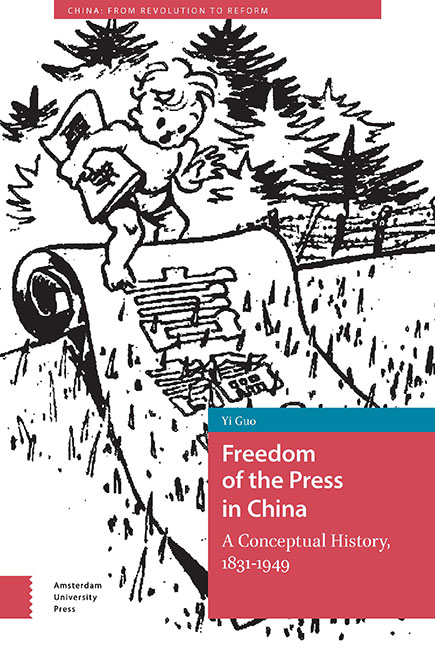Book contents
- Frontmater
- Contents
- A Note on Romanization
- Acknowledgements
- Foreword
- Introduction
- 1 The Enlightenment of the West
- 2 Chuban Ziyou: The Invention of a Neologism
- 3 The Liminal Landscape
- 4 The Intellectual Legacy of Sun Yat-sen
- 5 The Empty Phrase and Popular Ignorance
- 6 Conceptual Debates in the 1920s and 1930s
- 7 The Last Call for Press Freedom
- Conclusion
- Bibliography
- Index
4 - The Intellectual Legacy of Sun Yat-sen
Published online by Cambridge University Press: 20 November 2020
- Frontmater
- Contents
- A Note on Romanization
- Acknowledgements
- Foreword
- Introduction
- 1 The Enlightenment of the West
- 2 Chuban Ziyou: The Invention of a Neologism
- 3 The Liminal Landscape
- 4 The Intellectual Legacy of Sun Yat-sen
- 5 The Empty Phrase and Popular Ignorance
- 6 Conceptual Debates in the 1920s and 1930s
- 7 The Last Call for Press Freedom
- Conclusion
- Bibliography
- Index
Summary
Abstract
This chapter discusses Sun Yat-sen's thoughts on ‘liberty’ and their later development along anti-liberal lines. The near-deification of Sun Yat-sen in the late 1920s following his death ensured that his views and theories became the dominant discourse and that his intellectual legacy exerted significant influence on discussions of press freedom in China over the first half of the twentieth century. Sun Yat-sen's anti-liberal thoughts became integrated into the area of national news policy and journalism theory. The ‘San-min Doctrine of Journalism’ was formulated and came to dominate the official discourse. This later became the theoretical foundation that legitimized the policy of press censorship carried out by the Nationalist government.
Keywords: national liberty, three principles of the people, political right, authoritarianism, Kuomintang
The New Era
In the first decade of the twentieth century, when Chinese people maintained only a liminal perception and experience of the free press, Chinese revolutionaries began to organize and launch anti-Qing activities in the southern provinces. The revolutionaries came from different social classes, and many of them were members of anti-Qing secret societies known as huidang.. They were a loosely organized military force and were proficient at planning and conducting assassinations, military revolts, and other anti-government activities. Most of them knew very little about Chinese revolutionary philosophy and had no intention of establishing a republican government or a new democratic China. Many of them still regarded the revolutionaries’ anti-government and anti-Manchu activities as a necessary process to overthrow the old Manchu emperor and support a new Han emperor in his place. Indeed, the term ‘Chinese revolution’ meant nothing more to them than expelling the Manchus.
Under the guidance and leadership of Sun Yat-sen, the ‘reactionary’ Chinese intellectuals provided the revolutionaries with specialized knowledge of Western politics and insights into the future of Chinese revolution. Different from the older generation of traditional Chinese intellectuals, this rising generation of ‘reactionary’ Chinese were formed after the abolition of the imperial civil examination. Since there was no longer a pathway for them to serve in the imperial government through distinguishing themselves in this examination, many chose to study in Japan on a self-funded basis. Yet many only studied at Japanese tertiary institutions for a short time and did not obtain any diplomas or degrees.
- Type
- Chapter
- Information
- Freedom of the Press in ChinaA Conceptual History, 1831–1949, pp. 117 - 140Publisher: Amsterdam University PressPrint publication year: 2020



